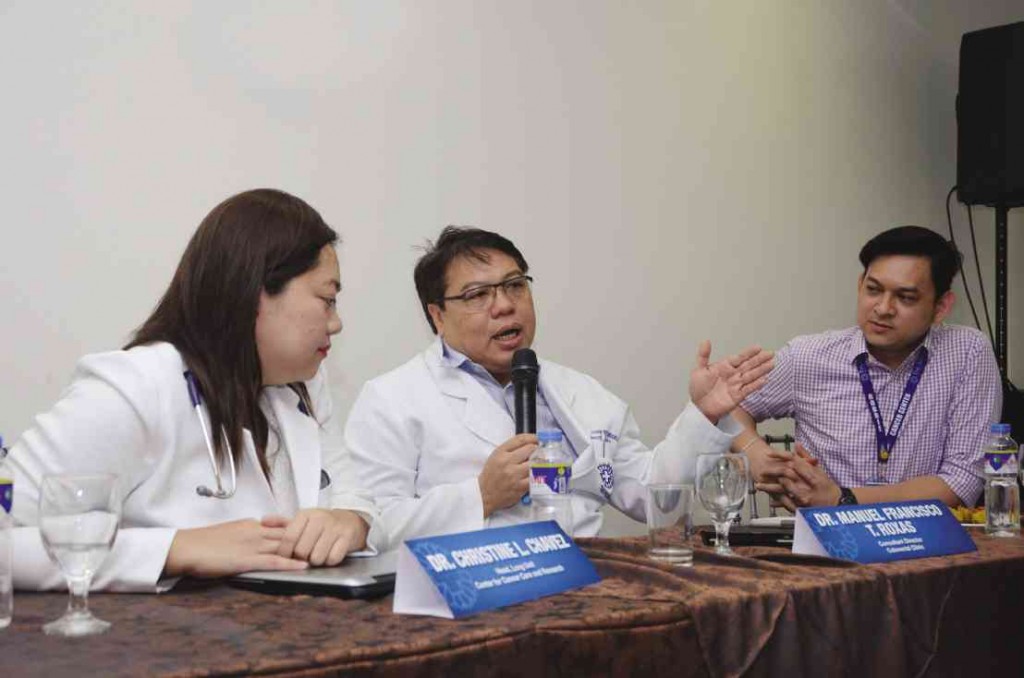Cancer screening: Early detection is key

There are at least 200 forms of cancer, and many more subtypes. According to the World Health Organization, approximately 14 million new cases and 8.2 million cancer-related deaths were recorded in 2012 alone. Sadly, the number of new cases is expected to rise by about 70 percent over the next two decades.
Among both sexes, the five most common sites of cancer diagnosed were lung, liver, stomach, colorectal, breast (women), cervix (women) and prostate (men). Frightening as cancer may be, doctors remind the public that treatment is more likely to be successful if one gets screened early and regularly.
This is why it is important to see a doctor—an oncologist would be the best person—especially if you notice an unusual or persistent change in your body (see list of symptoms). Although anyone can develop cancer, it is more common as one gets older or if one continues to ignore risk factors (like smoking and exposure to cancer-causing agents).
According to the Department of Health, cancer is the third leading cause of death in the Philippines.
Save lives
Dr. Manuel Francisco Roxas, consultant-director of the Colorectal Clinic of the The Medical City’s (TMC) Cancer Care and Research, said: “We could lower the incidences and even save a lot of lives if we all decide to undergo screening. We could easily detect colorectal, breast, cervical, lung and liver cancers long before their symptoms manifest in an individual.”
Roxas said: “Just like people, no two cancers are alike. Breast cancer behaves differently from colorectal cancer, or from lung cancer. The treatment, therefore, differs. You cannot have an expert in all cancers. And more importantly, you cannot have a wonder drug that cures all cancers.”
Tests also differ. For screening colorectal cancer, a fecal occult blood test (looking for traces of microscopic blood in stool samples that may indicate gastrointestinal bleeding) is recommended annually for individuals aged 50 and above.
According to the Philippine Cancer Society Inc., almost 75 percent of individuals diagnosed with colorectal cancer were 50 years old and above, and only about three percent were 14 years old and below. It is estimated that one out of 1,800 Filipinos will develop this type of cancer yearly.
“Screening could help cut down the incidence of colorectal cancer by 23 percent,” Roxas said.
Breast cancer screening is recommended for all women aged 35 and older. It involves an annual mammogram and ultrasound, aside from a clinical breast examination.
Screening for cervical cancer is recommended for all sexually active women, especially those who have a history of genital warts.
In the case of lung and liver cancers, a person is a candidate for screening following an in-depth profiling for risk factors (thus, lung cancer screening is most recommended for smokers, or liver cancer screening for those with history of excessive alcohol consumption and/or hepatitis infection).
Symptoms
It is important to be aware of any unexplained or unusual change in your body so if you spot something that isn’t normal, get it checked out. Here are symptoms you should watch out for:
• Breathlessness more than usual or for a lot of the time;
• Unexplained vaginal bleeding;
• Persistent heartburn or indigestion;
• Croaky voice or hoarseness;
• Diarrhea, constipation, or other change in bowel habits;
• Persistent bloating;
• Difficulty swallowing;
• Sore that won’t heal;
• Mouth or tongue ulcer that won’t heal;
• Heavy night sweats;
• Unusual breast changes;
• Blood in your bowel;
• Blood in your urine;
• Unexplained weight loss;
• New mole or changes to a mole;
• Coughing up blood;
• Persistent cough;
• Problems peeing;
• Unexplained pain or ache;
• Unusual lump or swelling in any part of your body.
Roxas said TMC’s cancer program adopted a multidisciplinary approach to cancer prevention, early detection, diagnosis and management. Under this program, specialists work in tandem in determining the treatment and care of a patient that is personalized to suit his/her specific requirements.
At present, TMC is the only hospital in the country with a section that focuses solely on colorectal cancer. The clinic provides expert diagnoses and multimodality treatments for colorectal cancer, including chemotherapy, radiotherapy and surgery.
It also promotes minimally-invasive procedures for early cases, as well as radical operations for advanced and recurrent cases. Laparoscopic surgery, trans-anal endoscopic microsurgery and robotic-assisted surgery are among the minimally-invasive procedures being offered by the clinic.
The clinic also caters to patients with anorectal diseases, such as hemorrhoids, perianal infection, fistula, fissures and fecal incontinence.
